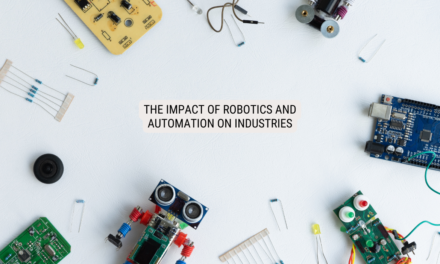The use of technology is unavoidable in today’s world. So, rather than cursing or disparaging it, we should learn to live with it and make the best of it. It raises the bar for efficiency, productivity, and safety to levels humans alone cannot achieve. It will also not be the first time technology will cause a shift in employment. History has shown that technology has become a job creator rather than a job destroyer.

The industrial sector worldwide is embracing technology to improve efficiency and productivity. Machines can reduce the production of defective products and production time. However, if unskilled and semi-skilled labourers remain uneducated and untrained, they may lose their jobs. However, if they improve their skills through training and development programmes, they will have more job opportunities. Workers will have more job opportunities if their occupation is computerised. Automation will benefit them as long as they can learn to use the new tools.
Technology has significantly impacted today’s job market, transforming the way people work and the types of jobs available. Here are a few instances of how technology has influenced the job market:
- Automation: The rise of automation has led to the displacement of many manual and repetitive jobs. This includes manufacturing, assembly lines, and data entry jobs. As machines and algorithms become increasingly sophisticated, more Jobs will likely be automated.
- New Job Opportunities: At the same time, technology has created many new job opportunities, particularly in fields such as information technology, software development, and digital marketing. These jobs require specialised skills and expertise, and they often pay well.
- Remote Work: The COVID-19 pandemic has accelerated the trend towards remote work. Technology advancements have made it easier to work from any location in the world, and many businesses are now willing to hire employees who work remotely. This has led to a more flexible job market, where employees can work from home or outside the office.
- Gig Economy: The rise of technology has facilitated the growth of the gig economy, in which workers accept short-term or freelance jobs rather than full-time positions. This has created new opportunities for people who want to work on their terms, but it has also led to a more precarious job market with fewer benefits and protections for workers.
- Artificial Intelligence: Artificial intelligence (AI) is becoming more prevalent in the job market. This technology can automate tasks, make predictions, and improve decision-making. However, it can also displace some jobs and change the skills required for certain positions.
Technology has had a remarkable impact on the job market in terms of creating new opportunities and changing the nature of work itself. To remain competitive in the job market, workers will want to keep up with the latest skills and trends as technology evolves.
The need for technology
Technology is essential in today’s world for a wide range of reasons. Here are some of the essential needs of technology:
- Communication: Technology has revolutionised communication, making it faster, easier, and more convenient. People can now communicate with each other instantly from anywhere in the world using tools like email, messaging apps, and video conferencing software.
- Education: Education has become more open and inclusive thanks to technology. The ability to acquire new skills and courses from the convenience of one’s home has been made accessible through online learning platforms and educational apps.
- Healthcare: Technology has improved healthcare, from telemedicine to electronic health records. Medical professionals can now use technology to diagnose and treat patients more effectively, while patients can use it to monitor their health and access medical information.
- Business: Technology has revolutionised the way companies operate, making it easier to automate tasks, manage data, and connect with customers. Businesses that embrace technology can gain a competitive edge and improve their overall performance.
- Entertainment: Technology has transformed the entertainment industry, making it possible to watch movies, listen to music, and play games on demand. It has also created new forms of entertainment, such as virtual and augmented reality experiences.
The Final Line
Incorporated into every aspect of our everyday life, technology has had a remarkable impact on the world. Our ability to learn, communicate, obtain healthcare, manage enterprises, and have fun has transformed. Increased productivity, comfort, and information access are just a few advantages that technology has given civilisation.
However, it has also brought challenges, such as the displacement of some jobs and the need for people to adapt to new technologies constantly. Keeping up with technology developments and using technology responsibly and ethically will be important as technology advances. Ultimately, the benefits of technology can only be fully realised if it is used to improve our lives and solve the many challenges facing society today.




